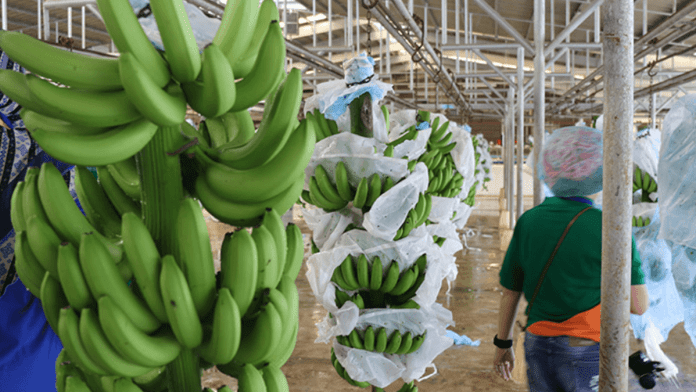News in Brief:
– Ecuador’s Ministry of Agriculture introduces a new Unique Banana Code to enhance transparency and combat illicit practices in the banana sector.
– The reform, endorsed by industry leaders, aims to formalise the sector and promote fair competition, with further adjustments anticipated.
Ecuador’s banana industry is currently undergoing a significant transformation with the implementation of Ministerial Agreement 015 by the Ministry of Agriculture and Livestock (MAG). This initiative introduces a new Unique Banana Code, marking a pivotal moment for local farmers and exporters.
The new code aims to streamline the identification process of banana producers and exporters by directly linking them with the Single Taxpayer Registry (RUC), a report says. By utilising the RUC as the primary identifier, the system seeks to eliminate the use of fictitious codes, thereby enhancing transparency and control in the sector’s operations.
Combatting illicit practices
One of the primary objectives of the Unique Banana Code is to combat illicit activities such as the contamination of export shipments with banned substances. By accurately identifying legitimate actors in the industry, this measure aims to safeguard the quality and integrity of Ecuador’s banana exports.
Industry leaders, including Richard Salazar of Acorbanec and José Antonio Hidalgo of AEBE, have welcomed the implementation of the new system. They emphasise its potential to formalise the sector and promote fair competition among stakeholders.
While the introduction of the Unique Banana Code marks a significant milestone, stakeholders acknowledge that further reforms, such as adjustments to the Banana Law, are necessary to fully formalise the sector. These reforms are crucial to adapting to market realities and ensuring the long-term sustainability of Ecuador’s banana industry.
The banana industry plays a vital role in the Ecuadorian economy, generating billions of dollars in exports annually. The reforms introduced by Ministerial Agreement 015 are poised to further strengthen the industry’s contribution to economic growth and development.



